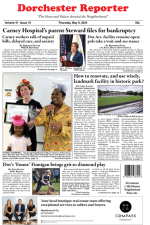August 27, 2009
I am at an age where a few of my friends have lost their wives. The period of adjustment appears deeper and longer than for wives who lose their husbands. But then I’ve always believed that women alone are more independent and self-sufficient than men.
Women play a much larger and important role in extended relationships than men are inclined to publicly acknowledge. Most men also believe it is in the natural order of things that they will be the first to die, so they don’t prepare for the loss of a spouse.
Coming home to an empty house in the weeks following a loss is depressing. Even worse is not having something to do and someplace to go; the important distraction that work can provide for a few hours.
Work provides a comforting routine and the opportunity to focus on things other than that all- pervasive sense of loss. Without the defenses that work, family, and activity provide, one can sink from loneliness through depression to despair.
Women are more resilient. They are more comfortable talking about their feelings and sharing their experiences. Male blustering notwithstanding, we need them more then they need us.
Daughters sense this more than sons and normally take the initiative in circling the family wagons around their father after the loss of their mother. That coming together, rallying to support one another in time of loss, is one of the more compelling expressions of love.
For older men, the loss of companionship is subtle. Just knowing that the one you have shared so much with in life is there can be an enormous comfort. That familiarity does not require much conversation or attention. Call it history or routine; it is an important component of mature love.
I feel better when my wife is home. Given that we have shared so much of our lives for so long, just knowing she is there is enough. It would be more of a struggle for me to fill that void. She is more resourceful.
I have observed a close friend who lost his wife a year-and-a-half ago go through this process. He is now at the difficult stage of trying to partly fill the void by identifying a companion with whom he could enjoy some of life’s simple pleasures: going out to dinner, taking a trip.
It isn’t easy. His wife set the bar very high and he is not inclined to lower his standards. Having made those inevitable adjustments over decades that make for a successful and happy relationship, the idea of beginning again must be daunting.
My father lost my mother 14 years before he died. I wish he had found someone to fill the many lonely hours he experienced in the years following her death.
The blending of two histories can be awkward; a lot of baggage is accumulated over the years. It is not the same as starting early and sharing the same experiences.
Marriage is a habit developed over a long period and deeply ingrained. A happy marriage may be the hardest habit to break. The death of a spouse does not end the dependence. There is no patch to ease the pain or the craving.
The lonely are out there trying to cope with the loss. The fortunate will find respite in the comfort of a new relationship. Some will persevere through withdrawal and eventually be able to control the yearning.
Others will eventually die of a broken heart.
James W. Dolan is a retired Dorchester District Court judge who now practices law. His e-mail is jdolan@dolanconnly.com.

